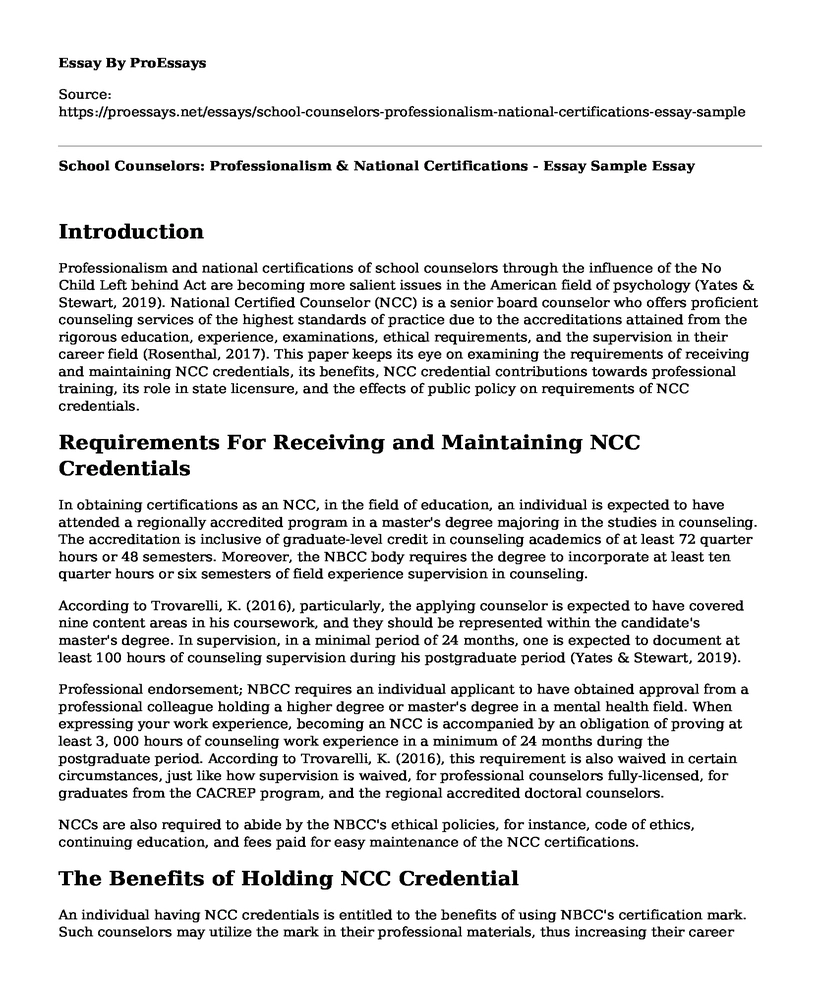Introduction
Professionalism and national certifications of school counselors through the influence of the No Child Left behind Act are becoming more salient issues in the American field of psychology (Yates & Stewart, 2019). National Certified Counselor (NCC) is a senior board counselor who offers proficient counseling services of the highest standards of practice due to the accreditations attained from the rigorous education, experience, examinations, ethical requirements, and the supervision in their career field (Rosenthal, 2017). This paper keeps its eye on examining the requirements of receiving and maintaining NCC credentials, its benefits, NCC credential contributions towards professional training, its role in state licensure, and the effects of public policy on requirements of NCC credentials.
Requirements For Receiving and Maintaining NCC Credentials
In obtaining certifications as an NCC, in the field of education, an individual is expected to have attended a regionally accredited program in a master's degree majoring in the studies in counseling. The accreditation is inclusive of graduate-level credit in counseling academics of at least 72 quarter hours or 48 semesters. Moreover, the NBCC body requires the degree to incorporate at least ten quarter hours or six semesters of field experience supervision in counseling.
According to Trovarelli, K. (2016), particularly, the applying counselor is expected to have covered nine content areas in his coursework, and they should be represented within the candidate's master's degree. In supervision, in a minimal period of 24 months, one is expected to document at least 100 hours of counseling supervision during his postgraduate period (Yates & Stewart, 2019).
Professional endorsement; NBCC requires an individual applicant to have obtained approval from a professional colleague holding a higher degree or master's degree in a mental health field. When expressing your work experience, becoming an NCC is accompanied by an obligation of proving at least 3, 000 hours of counseling work experience in a minimum of 24 months during the postgraduate period. According to Trovarelli, K. (2016), this requirement is also waived in certain circumstances, just like how supervision is waived, for professional counselors fully-licensed, for graduates from the CACREP program, and the regional accredited doctoral counselors.
NCCs are also required to abide by the NBCC's ethical policies, for instance, code of ethics, continuing education, and fees paid for easy maintenance of the NCC certifications.
The Benefits of Holding NCC Credential
An individual having NCC credentials is entitled to the benefits of using NBCC's certification mark. Such counselors may utilize the mark in their professional materials, thus increasing their career achievements value. According to Rosenthal (2017), the publications and materials provided by NBCC issues board certification support and enhance effective practices among the certified counselors. Through such materials, counselors having this credentials benefits from current knowledge based on researches, news update in the counseling profession, and access to NBCC portal from which one easily tracks their continuing education.
The benefit of special offers and initiatives; being a member of the NBCC not only revolves around credentials but also on exceptional government opportunities on actions such as transitioning counselors to decision-makers, enrollment priorities on international opportunities, their score verifications are also discounted and specialized practice demonstration in school and clinical counseling.
The Role of NCC Credential in State Licensure
NCC credential helps demonstrate to the public or state that the identified counselors have met the high national standards by the counseling profession. Therefore, having NCC credentials eases the process of applying for this licensure; since all exams, including the NCE and NCMHCE (Yates & Stewart, 2019), as the requirements by state licensure is already covered by the NCC credential holder.
Through its policy bodies like NAADAC, the national government may alter the training, recruitment, and retention strategies by NCC. This may increase more restrictions to the NCC registration requirements or encourage registration of unqualified counselors to take part in the high national standard counseling education.
References
Rosenthal, H. (2017). Encyclopedia of counseling: master review and tutorial for the National Counselor Examination, state counseling exams, and the Counselor Preparation Comprehensive Examination. Routledge. Available online: https://content.taylorfrancis.com/books/download?dac=C2015-0-60731-2&isbn=9781317370307&format=googlePreviewPdf
Trovarelli, K. (2016). National Association of School Psychologists approved programs applying for Nationally Certified School Psychologist. Available online: https://rdw.rowan.edu/etd/1547/
Yates, C. M., & Stewart, L. A. (2019). Counseling Certification. Handbook of Counseling and Counselor Education.
Cite this page
School Counselors: Professionalism & National Certifications - Essay Sample. (2023, Apr 02). Retrieved from https://proessays.net/essays/school-counselors-professionalism-national-certifications-essay-sample
If you are the original author of this essay and no longer wish to have it published on the ProEssays website, please click below to request its removal:
- Report of School: St. John's University
- Paper Example on Creativity in the Workplace: A Vital Aspect for Success
- Organizational Culture: Maslow's Hierarchy of Needs for Employee Motivation - Essay Sample
- Applying for Graduate Teaching Program: Literature Education to Middle Children and Adolescents
- Essay Example on Bipolar II Disorder: A Historical Look at its Development
- Paper Example on Sensory Experience & Customer Loyalty: Analyzing Factors Correlating to Loyalty
- Report Evaluating Opioid Prevention Programs in Elementary Schools: Considerations and Methodology







